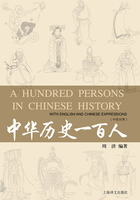
46 Zhuge Liang
A Man Symbolized Wisdom of Chinese Nationality

Zhuge Liang (181-234) was the first hero in the Three Kingdoms Period. (There were so many household names of heroes in the Period.) He showed off his miraculous wisdom and his name became a replacement word of “wise man”. Zhuge Liang at first secluded himself in his home village in Nanyang County Henan Province, and came out to be Liu Bei’s strategist advisor (top military commander) after Liu’s three visits to his cottage. Zhuge commanded troops fighting from east front to west, with sitting in a cart chair, wearing a Taoist garment and wielding a feather fan in hand. At begining, Zhuge encountered the Chi Bi War (Red Cliff at bank of Yangtze in Hubei Province), a stage that brought Zhuge’s wisdom into full play. In the war, Cao Cao commanded dominating powerful troops southward, attempting to conquer Sun Quan, the warlord occupied the area of Yangtze Delta. Zhuge had offered a policy to Liu Bei as “to ally with Sun to fight Cao”, and Zhuge himself was sent to Sun’s camp to be a member of Sun’s think tank. In the campaign, Zhuge acted as a prophet, predicted accurately how things would happen, and helped the allied forces beat powerful Cao’s troops. The Chi Bi War was another example of “the weaker beating the stronger”, and resulted in founding the situation of the Three Kingdoms Period. There were many Zhuge’s stories becoming household tales, such as “Straw boats receiving arrows”, “Borrow east wind” and “A empty-city scheme”, just mentioned a few. Afterwards people had viewed Zhuge Liang as the symbol of “wise man”, nicknamed some wise strategist as “little Zhuge”, called a resourceful man as “a man wielding a feather fan”. Also, there were idioms like: “three wretched shoe-smiths could become a Zhuge Liang”, etc.
People also admired Zhuge Liang’s moral integrity. When he set out going on his last expedition, he expressed his loyalty to the emperor (Liu Bei’s son) saying he would “play his ability out to his death”. He also wrote a private letter to his son, admonishing: “refrain from seeking fame and gain, keep calm to pursue your goal.” The words had both become popular idioms.
Zhuge had invented a special kind of weapon: “wooden ox and mobile horse”. Accordingly, one ox could load foodstuffs supplied to ten soldiers for a month, while the mobile horse, though less loaded, could walk on small paths across mountains. There were books recorded detailed pictures and explanations. Modern experts tended to believe they were true, and international symposiums were held for several times in recent decades, but the mystery couldn’t as yet be uncovered.